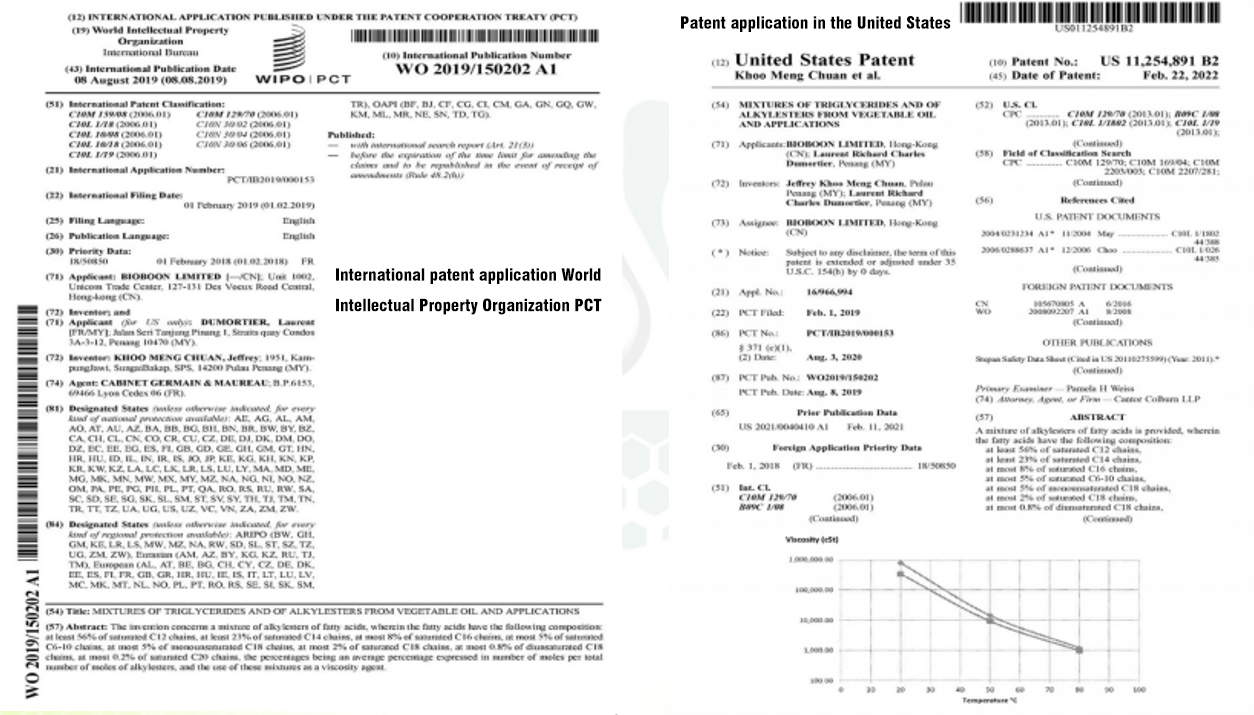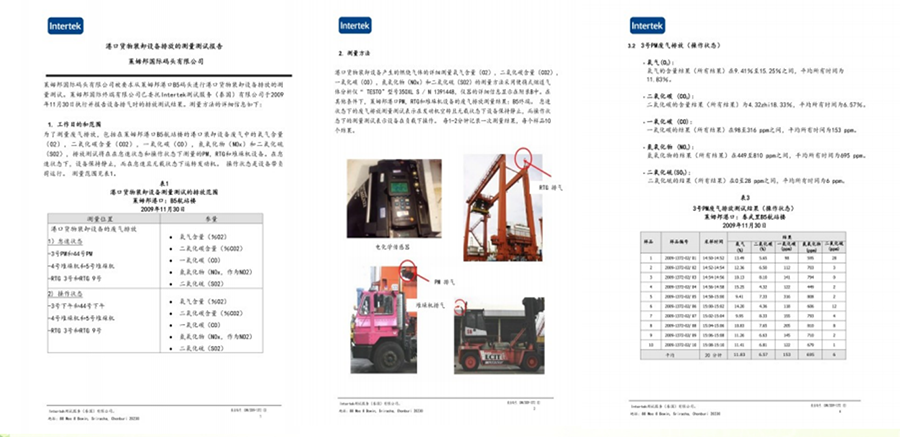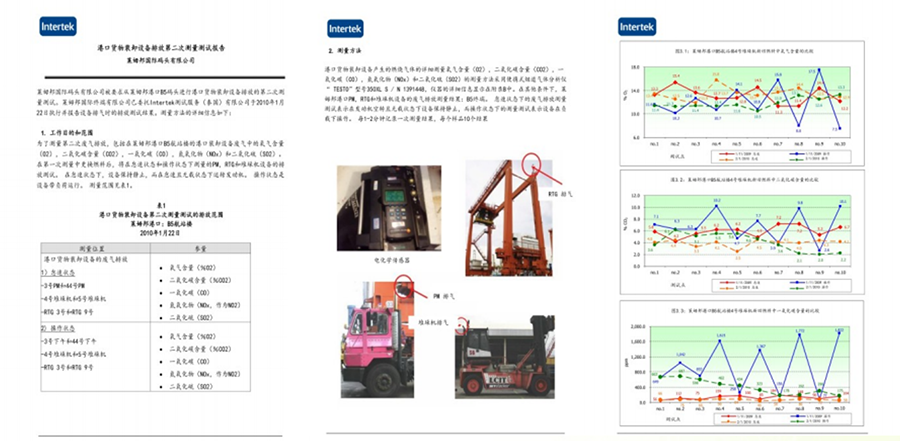• NGO-U4-1 is an active, organic, environmentally friendly and degradable green product developed by the R & D team of Wanwusheng. It is mainly based on natural plant matrix and its derivatives, which can effectively separate crude oil from water and solid substances. It is a biodegradable nano-heavy plasticizer. Even when mixed in high pressure hot water, its extremely high flash point prevents any pyrolysis.
• NGO-U4-1 is also not toxic to water, soil and the environment in the event of a spill or accidental discharge at the site of use.
• The residues of NGO-U4-1 in the sea do not produce any toxicity.
• Suitable for cleaning of oil transportation tanks, cleaning of storage tank bottoms, heavy oil and residue tank bottoms, dirty oil pools, colloidal asphalt residues, and oil recovery.
• It is suitable for oil field, refinery and other ground oil pollution cleaning and oil recovery.
• It is suitable for the cleaning and oil recovery of the oil tank on the ship, the heavy oil storage of the ocean-going ship and the oil leakage of the ship.
NGO-U4-1 can clean most difficult insoluble substances such as crude oil colloid and asphalt.
Crude oil contains a large number of asphaltenes and colloids. Due to the external environment and its own structural characteristics, the precipitation and adsorption of asphaltenes and colloids often occur in the actual exploitation, transportation, storage and processing. Colloidal asphaltenes can deposit on the surface of the contact medium by virtue of their unique characteristics, forming surface deposition. Therefore, it is an important work to prevent and control the hazards of resin and asphaltene.
The harm of asphaltene and resin in crude oil in the process of storage and transportation: The content and nature of asphaltene and resin in crude oil affect the viscosity of crude oil. The more the content of asphaltene and resin in crude oil, the greater the viscosity of crude oil. At the same time, N and S occupy an important position between asphaltene molecules. Therefore, in order to effectively reduce the viscosity of crude oil, Traditional methods still have some shortcomings. In the past, crude oil was heated to raise the original temperature, but this method will lead to asphaltene precipitation on the surface of the heater, eventually forming carbon deposits, affecting the efficiency of heat transfer.
Hazards of asphaltenes and resins in the process of petroleum refining: In the process of crude oil refining, heavy oil contains a large amount of asphaltenes and resins, so asphaltenes and resins often cause blockage problems in oil refining pipelines and equipment. At the same time, asphaltenes are rich in acidic functional groups. It will also cause corrosion to carbon steel equipment and pipelines. In addition, the asphaltene of crude oil contains a large number of heavy metal elements, which will poison the catalyst. Asphaltene also contains a large number of polycyclic aromatic hydrocarbons, when it reaches a certain temperature, the accumulation and condensation of asphaltene will cause carbon deposition in equipment, thus blocking the pipeline.
NGO-U4-1 can quickly and effectively decompose the insoluble substances such as asphaltenes and resins in crude oil. Universal Life uses biotechnology to develop new processes that can more cost-effectively manage crude oil waste and the cleaning and recycling of crude oil storage, processing facilities and heavy oil tanks.
NGO-U4-1 Disruptive Clean Technology Innovation for Heavy Oil Decomposition
Take ship heavy fuel as an example.
In 2020, the total number of merchant ships of 100 gross tonnage and above in the world was 98,000, totaling 2.06 billion tons. By January 2021, the capacity will be equivalent to 2.13 billion deadweight tons. Data show that the current global consumption of marine fuel oil is about 300 million tons.
In view of the fact that most ships still use high viscosity and high sulfur fuel oil (HSFO), such fuel oil will adhere to the inner wall of the oil tank, forming a semi-solid material layer containing sediment and asphaltene sludge, and will also deposit in the fuel pipeline, settling tank and daily tank, which does not meet the environmental emission requirements, but also increases the operating costs. Therefore, it is necessary to regularly clean ship's fuel oil tanks and fuel oil system pipelines. The time required for the ship to enter the dock for fuel oil tank cleaning varies from ship to ship, but generally speaking, the average time for each fuel oil tank cleaning is 2-4 days. In addition to the flushing of the fuel oil system pipeline of the ship, the time required for each ship to complete the cleaning and flushing is about 1-2 weeks. In addition to manual cleaning, the ship can also gradually clean sediment and asphaltene sludge in the HSFO oil tank and fuel system with special additives. This method is relatively safe and simple, which can save a lot of time and economic costs for the ship.

NGO-U4-1 Fully biodegradable organic material
The fuel oil system of the ship in normal use must be cleaned regularly. The heavy oil used in the fuel oil system of the ship can not directly enter the main engine or the auxiliary engine. The service life of the diesel engine will be affected if there are many impurities and moisture in the fuel, so the oil in the storage tank will be sent to the sedimentation tank, and then the oil in the sedimentation tank will be separated into the daily tank by the oil separator, so that it can be used by the main diesel engine. The heavy oil normally used in the ship fuel oil system will leave a large amount of solid residual oil waste in the fuel oil tank, sometimes up to 14% of the heavy oil, which can not be used by the ship engine. The waste of this part of fuel oil system must be regularly cleaned in the dock at the port, and then pumped out for recycling and reuse. Because of the high cost of treatment, many ship owners abandon this part of fuel oil in order to save money. More than two thirds of these waste oils can still be used as fuel for marine engines when mixed with our NGO-3.

NGO-U4-1 Product Application
NGO-U4-1 can maximize the recovery of heavy oil from the sludge on the ground, storage and transportation facilities, processing facilities, tank bottom, tank tank and other sludge, convert these wastes into commercially valuable fuel, and reduce the overall recovery cost. It is a biodegradable active nano-heavy plasticizer, a new process solution for green, low-carbon, safe and clean treatment of petroleum developed by biotechnology, which can manage the cleaning and recycling of crude oil waste, crude oil storage and transportation, processing facilities and heavy oil tanks with better cost-effectiveness.

NGO-U4-1 Product Features
● The application of NGO-U4-1 product technology can significantly improve the reaction rate and separation rate of the crude oil to be treated. In other words-shorten the oil clean recovery process time and increase the oil recovery rate.
● NGO-U4-1 is tailor-made for the decomposition of long hydrocarbon bonds. It selectively decomposes and reshapes the molecular chain, effectively reducing the viscosity of petroleum and effectively decomposing, stripping and layering high-viscosity resin and asphaltene sludge.
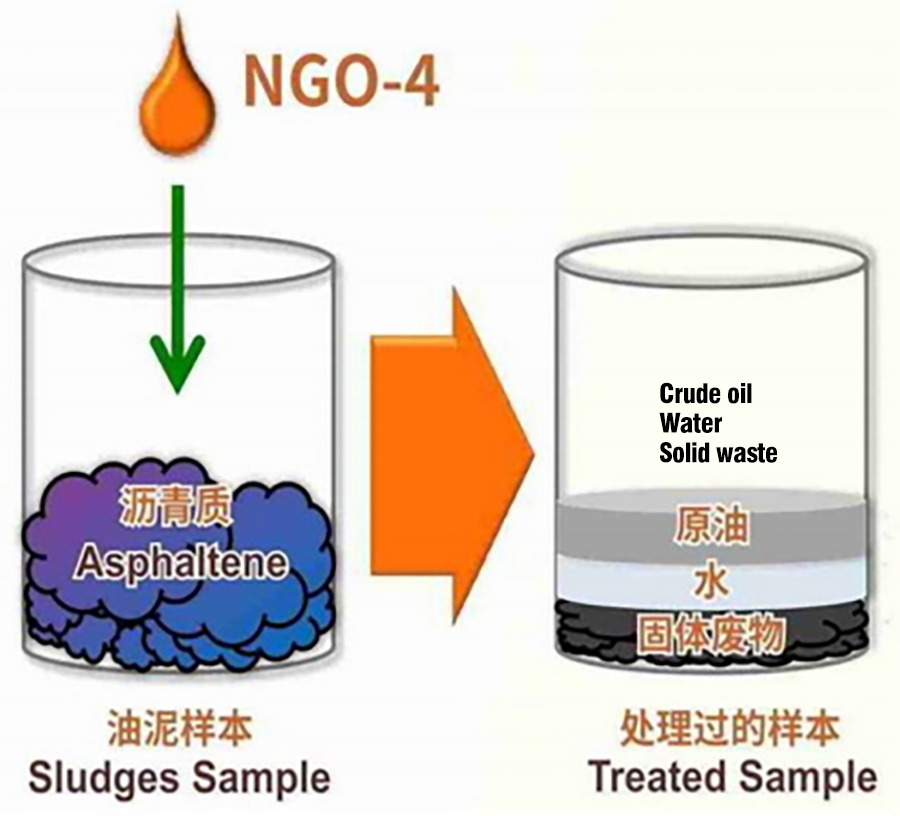
water
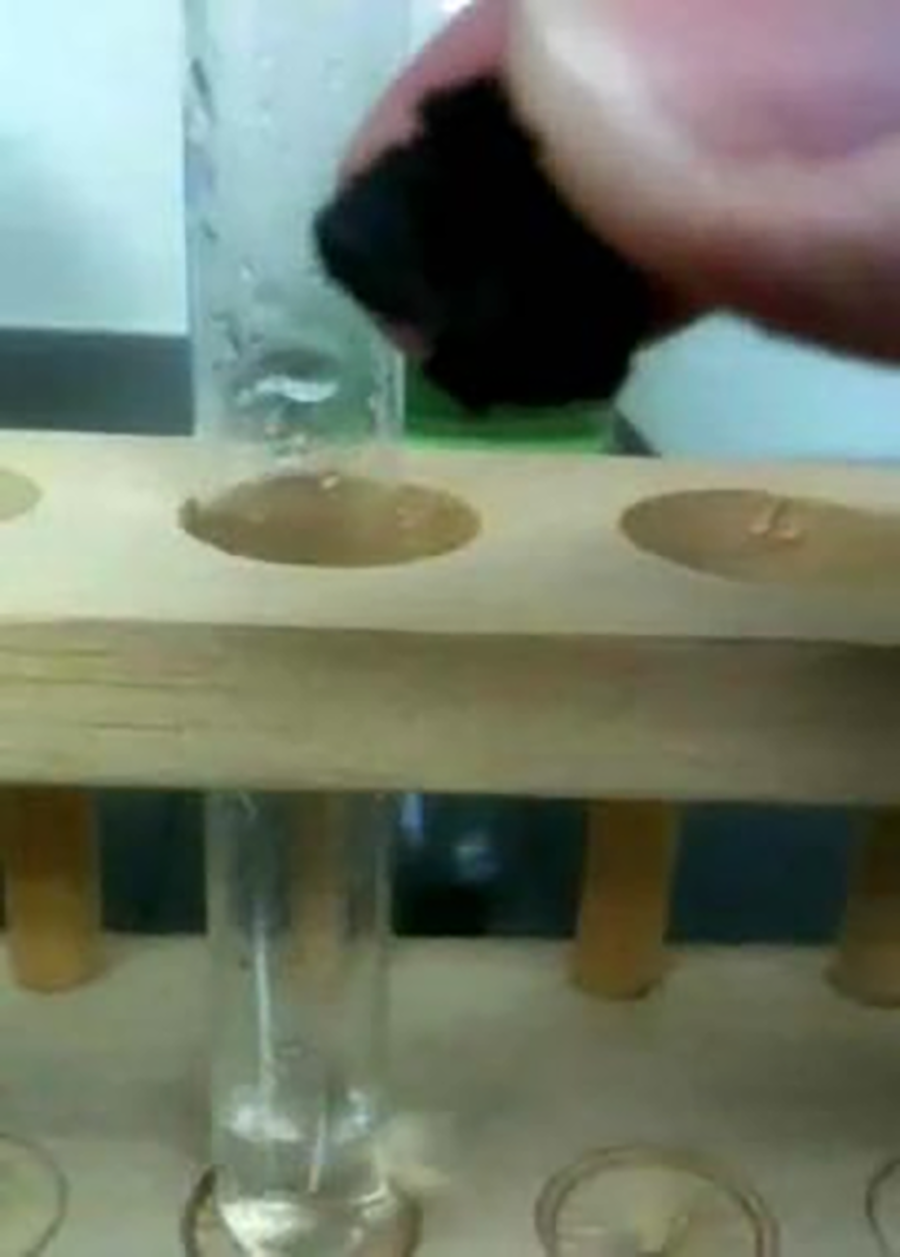
Oil sludge
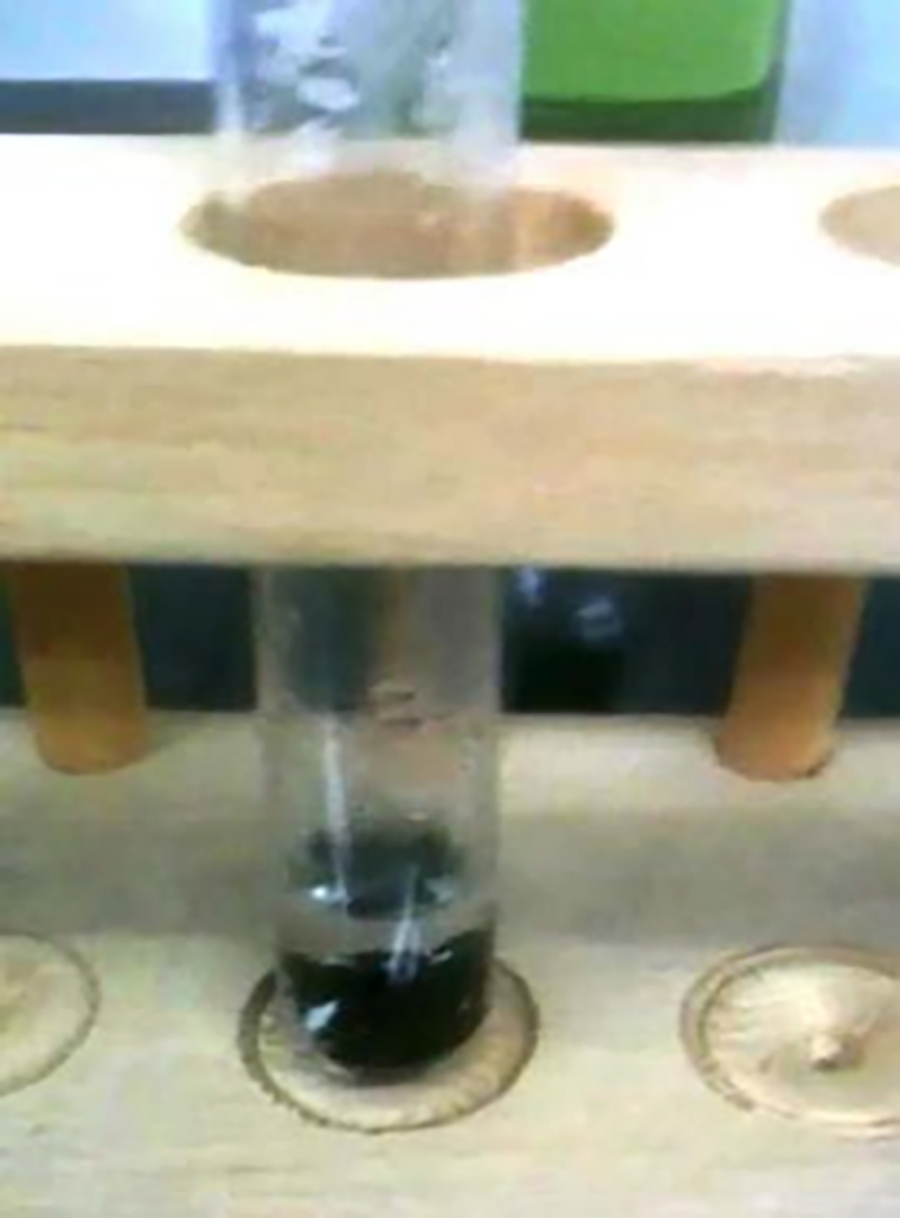
Added NGO – 4
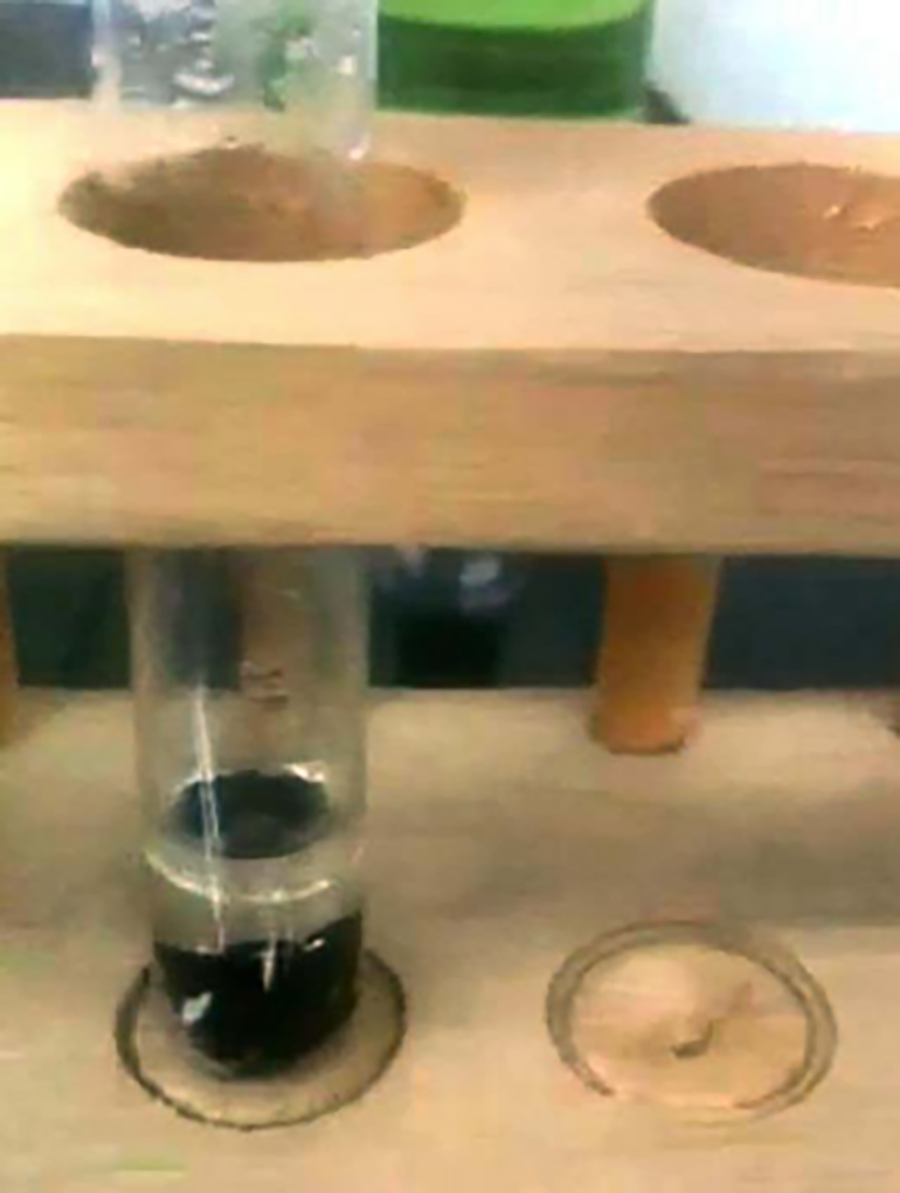
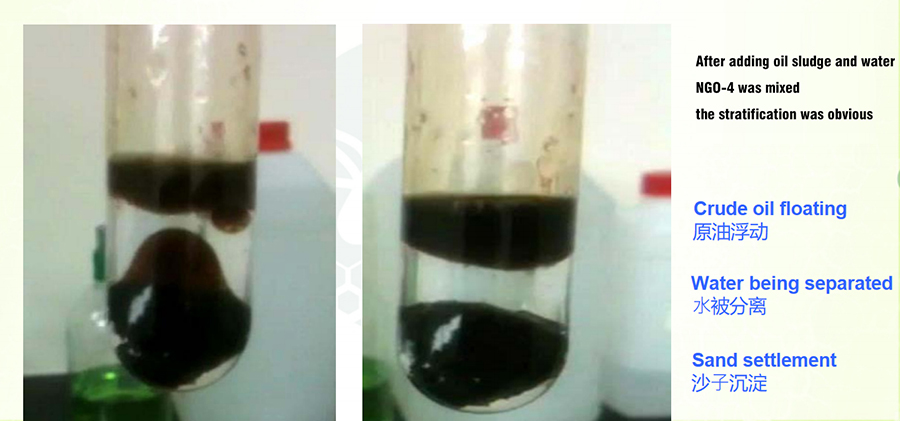
NGO-U4-1 reduces the interaction between the particles and the wall, resulting in easier slippage between them, thereby keeping the inner wall of the container clean. This process is called the sliding effect.
It quickly cleans the inside of the storage tank, the walls, and the HFO fuel tank.
It provides a more efficient cleaning process while adding commercial value to the waste being cleaned.
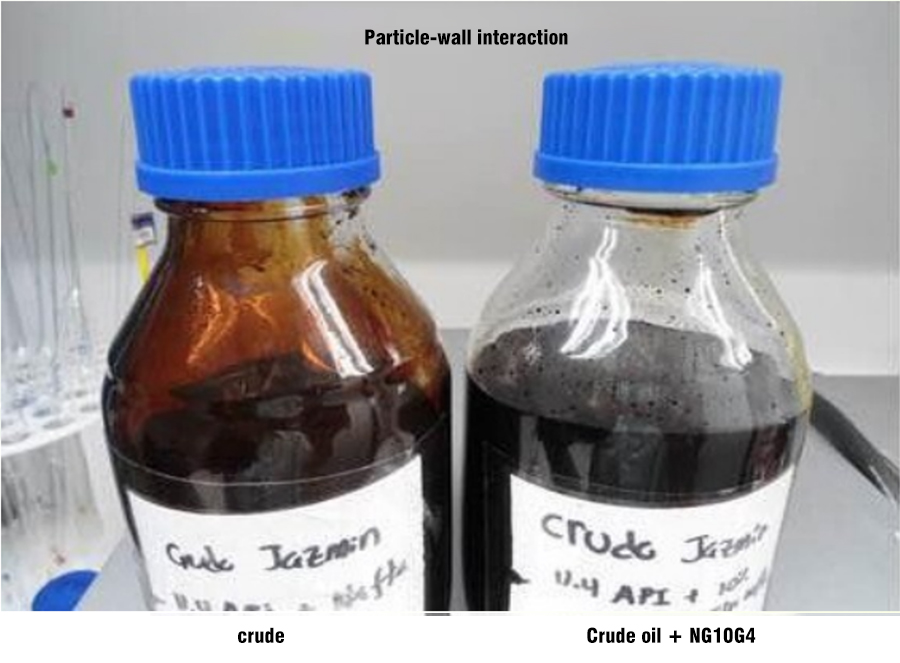
● Low-carbon environmental protection technology, which can reduce the toxicity of discharged water in use.
● NGO-U4-1 is a fully biodegradable active nano-organic material.
● NGO-U4-1 will not cause any toxicity to water, soil and environment in case of leakage or accidental discharge at the site of use.
● The residues of NGO-U4-1 in the sea will not cause any toxicity.
● NGO-U4-1 is an innovative green environmental protection technology product with natural matrix, which meets HSE standards.
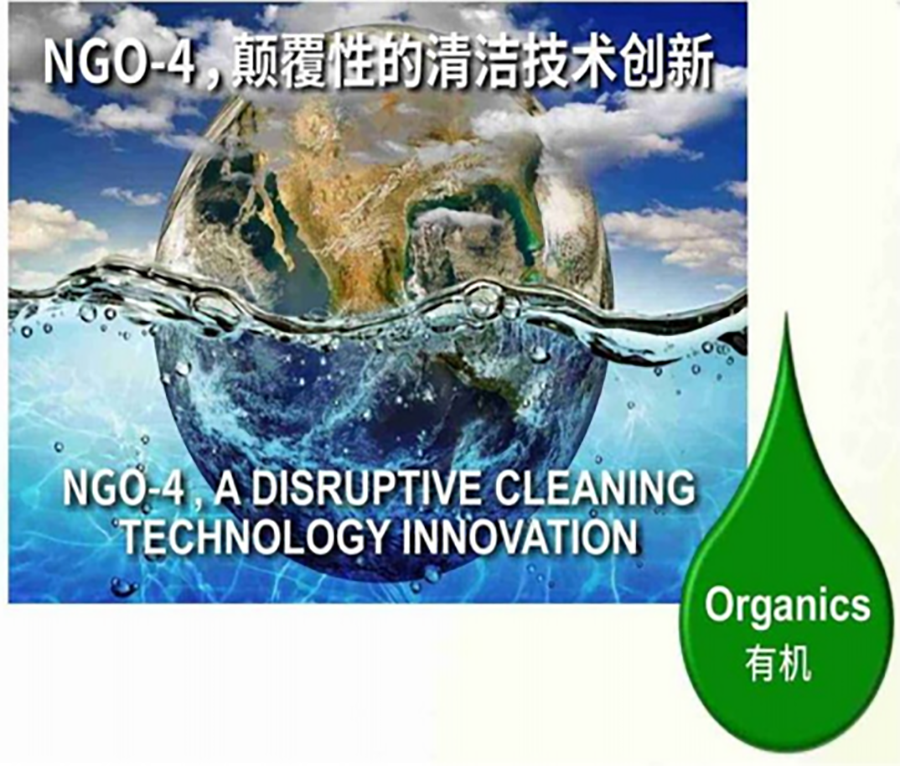
Widespread use of NGO-U4-1
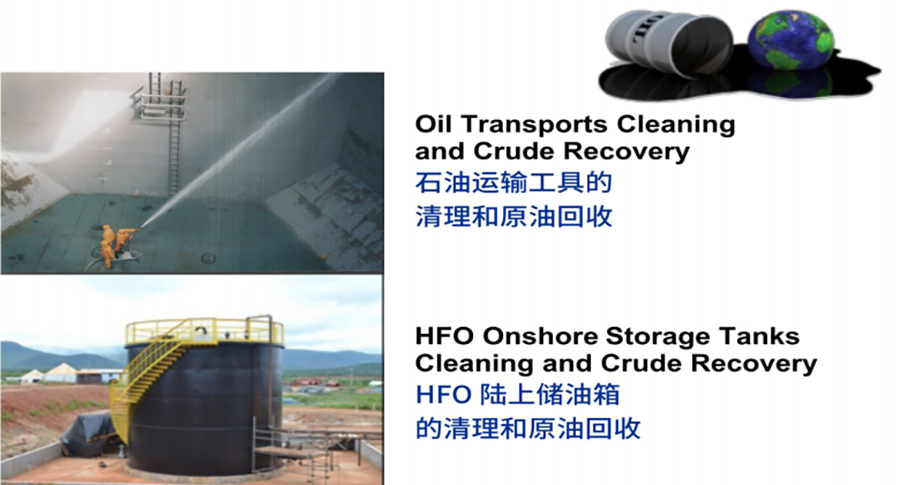
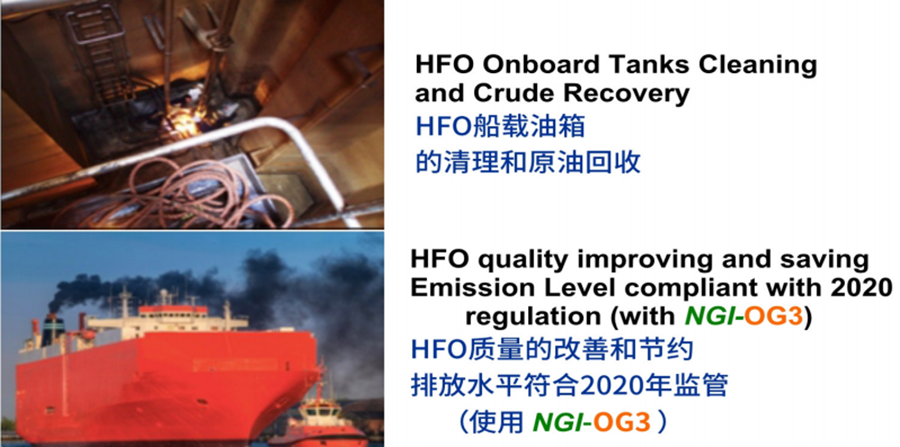
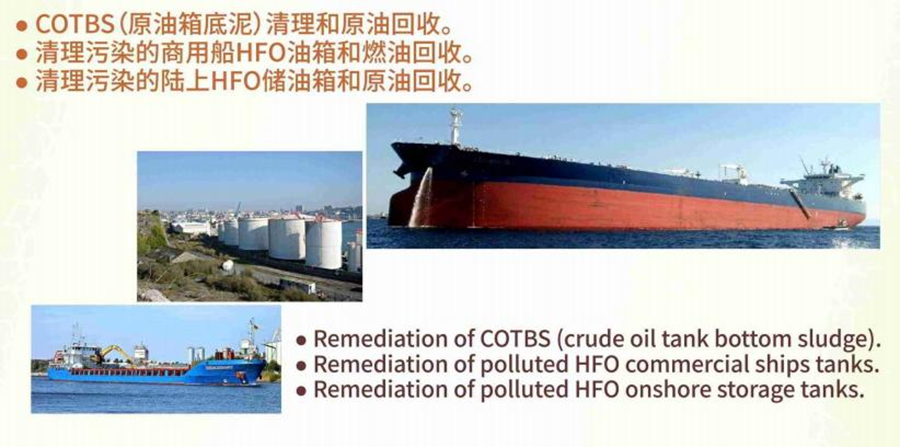
Application prospect of that product
There is no doubt that China's growing demand for oil will have a significant impact on climate change, air quality and people's quality of life. The carbon footprint left by oil is obvious. With the increase of oil consumption, the expansion of overseas oil investment and the improvement of capacity, China will play a key role in the Asian and global oil product market.
Even if economic growth slows, China's oil consumption will continue to grow at an annual rate of about 5%. To meet this demand, China will have to use "dirty oil" that is cheaper but more damaging to the environment, such as oil sands oil. Without new regulations that take climate change or a carbon tax into account, China's growing oil demand will have a significant negative impact on air quality and climate change.
Another major environmental challenge facing China is water, which is an indispensable resource when extracting heavy oil through fracturing. Therefore, the development of unconventional oil will have to compete with agricultural, industrial and urban users for limited water resources. In addition, the sewage treatment in the fracturing process is also a difficult problem for China.
There are more than 3000 kinds of additives and additives used in petroleum exploitation from oil field to gathering, refining, production of refined oil, fuel oil and deep processing of fine chemical products, many of which are toxic, harmful, polluting and non-degradable products, which will cause a large number of hazardous wastes after use. In order to reduce the impact of petroleum resources development on the environment, promoting the use of environmentally friendly, degradable and pollution-free petroleum environmental protection additives is the best way at present. The state is also introducing various promotion policies. At present, the NGO active nano-biological petroleum additives produced by Wanwusheng Company can be applied in the whole industry chain of petroleum processing, and they are environmentally friendly and pollution-free. Can be biodegraded, does not cause secondary pollution in the use process, and has great market development and application prospects in the future.
Patent report
